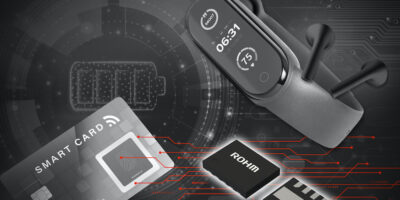Battery charger IC is designed for low voltage charging for wearables
A battery charger IC has been designed by Rohm for low-voltage charging. The BD71631QWZ is suitable for wearables like wireless ear buds and thin, compact IoT devices such as smart displays powered by rechargeable batteries.
The need for safer, higher density rechargeable batteries has led to the development of new battery types, including all- or semi-solid types and using novel materials for the electrode part and batteries that adopt different terminal compositions. Many of the latest rechargeable batteries are small and thin, requiring low voltage charging in the 2.0 to 3.0V range. There are currently no battery charger ICs that can handle a wide voltage range, says Rohm.
The BD71631QWZ battery charger IC supports low voltage charging of Li-ion but also new types of rechargeable batteries such as all-solid and semi-solid state models. The IC achieves low voltage charging over a wide range from 2.0 to 4.7V by improving the stability of the internal circuit
Unlike general battery charger ICs that provide a fixed voltage, the BD71631QWZ battery charger IC allows the charge voltage to be easily set by simply changing the external resistor, reducing design load when changing batteries. The original package technology results in a compact package just 0.4mm thick, which is 60 per cent lower than conventional products in this market to make devices smaller and thinner. Each charging characteristic like charge/termination current can be set for CCCV charging, providing an optimal charging environment for thin, compact IoT and wearable devices usng the latest rechargeable batteries.
In addition to devices using low voltage and single-cell Li-ion rechargeable batteries, the battery charger IC can be used in wearable devices, such as wireless ear buds, electronic pens, e-cigarettes, smart displays or tags and other compact IoT devices.
An evaluation board, BD71631QWZ-EVK-001, is also available.
Rohm Semiconductor develops and manufactures a large product range from SiC diodes and MOSFETs, analogue ICs such as gate drivers and power management ICs to power transistors and diodes to passive components.




